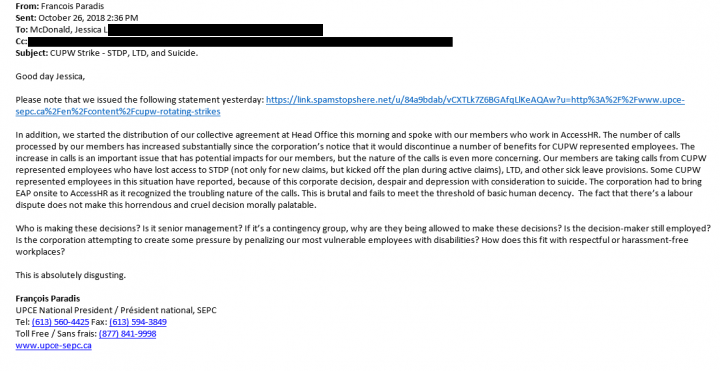On Monday, Oct. 22 the Canadian Union of Postal Workers (CUPW) announced rotating strikes around the country; the climax of a labour dispute that lasted nearly a year after negotiations.

After the expiry of the CUPW contract, Canada Post decided to discontinue sick leave provisions, including short-term disability – even for workers with claims predating the strike action, according to the CUPW.
“I got a phone call from my supervisor at work and was told that I have the option of returning to work or the option of applying for employment insurance medical benefits,” a Canada Post worker who had been on short-term disability said.
The worker suffers from mental illness and spoke on the condition of anonymity.
“I feel unsafe at certain times when I’m at work; just dealing with the everyday stresses of work and things going on outside of work,” she said.
Those feelings needed to be put aside when, after one month off, she decided to return to work.
“Being forced back to work wasn’t really something I was looking forward to, but unfortunately, many people from across the country have lost their disability benefits,” she said.
“I think there’s many of us that are working at Canada Post right now that feel we have no recourse,” she continued.
In a statement, the Union of Postal Communications Employees (UPCE) said they were “appalled” to learn of the decision, “especially during rotating strikes while a majority of the impacted employees remain actively at work.”
Global News obtained a copy of an internal email sent from François Paradis, national president of the UPCE to Jessica McDonald, the interim president and CEO of Canada Post.
The email claimed employees at AccessHR – the call centre that handles calls from postal workers – have received a substantial increase in calls once employees noticed a number of benefits were discontinued.
The changes weren’t isolated to locations impacted by rotating strikes, but affected postal workers across Canada.
“Some CUPW represented employees in this situation have reported, because of this corporate decision, despair and depression with consideration to suicide,” Paradis wrote in the email.

Get daily National news
“This is brutal and fails to meet the threshold of basic human decency. The fact that there’s a labour dispute does not make this horrendous and cruel decision morally palatable,” he continued.
Paradis concluded the email demanding to know who authorized the decision, and whether or not they were still employed, before adding one final sentence.
“This is absolutely disgusting,” it read.
Upon learning that Global News had obtained the email, Paradis said “That email was never meant for public distribution. However, while it is strongly worded, I stand by every word.”
In an email added that “no employer should attempt to win labour disputes with tactics that prey on the most vulnerable,” and that UPCE stands by their original statement calling the matter a question of morality, not legality.
“But we want to make sure that we don’t cause any undue hardship on anyone,” Hamilton added, noting benefit coverage for prescription drugs, dental care and hearing has been extended.
Canada Post is also offering to review individual situations on a case-by-case basis.
“If anyone’s facing extenuating circumstances we want them to contact us and we’ll review those cases so we can provide them, or their families, or whatever they’re going through some relief on a compassionate basis,” Hamilton said.
But compassion isn’t what the postal worker felt.
“The way for them to be compassionate would be to keep all benefits instated; keep disability there so people don’t have to worry about financial hardships,” she said.
There is some hope for those who had their disability benefits discontinued.
Regina-based lawyer Greg Fingas says Canada Post could be violating federal law.
“The law federally, as well as in Saskatchewan, says you’re not allowed to either threaten to cancel a benefit plan or threaten to/refuse to provide benefits under an existing plan,” Fingas, a partner with Gerrand Rath Johnson LLP said.
“If it’s happening that Canada Post, or their provider, is refusing to provide benefits that were bargained for, and for which premiums are being paid, that is an unfair practice. There is an application you can make to the Canada Industrial Relations Board to prohibit them from doing that,” he continued.
Fingas did note the Canada Labour Code does allow terms and conditions of contracts to be changed during strike action, but there are select benefits employers are prohibited from pulling during the course of a strike or lockout, including disability benefits.
In an email Canada Post said they have received “a small number of requests from employees, all with compassionate circumstances have been approved.”
Rotating strikes have occurred in Victoria, Edmonton, Windsor, Halifax, Toronto, and are being extended to Winnipeg and Brandon.
Thousands of workers have participated in 24-hour walkouts protesting health and safety concerns and forced overtime.
Postal workers will receive the same rate of pay for time worked during the strike action and Canada Post will continue to operate throughout the rotating strikes.
UPDATE:: Canada Post has responded to claims that they may have violated the law saying:
“Section 94(3)(d.1) of the Canada Labour Code confirms that once the parties are in a legal strike/lockout position, an employer cannot “cancel or threaten to cancel a medical, dental, disability, life or other insurance plan…so long as the bargaining agent tenders or attempts to tender to the employer payments or premiums sufficient to continue the plan. CUPW has not offered to pay the premiums. Advance notice was provided. Therefore there is no legal obligation to continue those benefits.”









Comments
Want to discuss? Please read our Commenting Policy first.